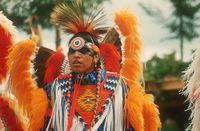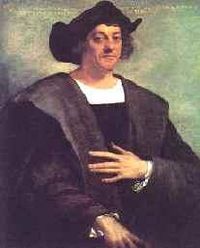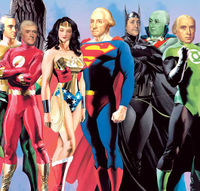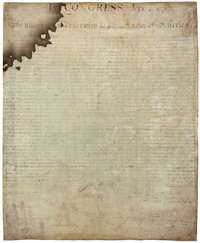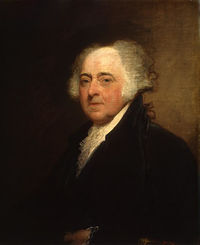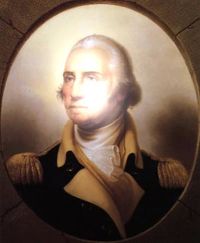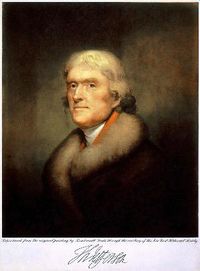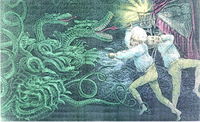User:Pumpkins
American History! is an American history textbook developed by the Primary Middle School Institute for Nonprofit Grading, or PMSING, for use by 8th grade students in fuck you i like boys and u i want to fuck u cuz you are gay and need to get a life and i hate you
Early American history: circa 8,000 B.C. to 1492[edit | edit source]
Main Article: Native Americans
You would be surprised to learn that American history actually began almost 10,000 years ago. So that you can learn about the really important and exciting aspects of American history, like The American Revolution, South Carolina's many, many failed and angst-filled attempts to secede from the union to become The United State of Carolina, and the thrilling controversy of the United States National Bank, we're virtually going to brush away ten thousand years of boring Native American history in a few sentences.
The first Americans came to North America thousands of years ago chasing mammoths across an icy land bridge between Siberia and what is now Alaska. After the land bridge melted and mammoths became extinct, those first Americans realized that they were stranded in a barren continent overflowing with deserts, tornadoes, and useless, inedible gold. However, over the next few thousands of years, Native Americans would adapt to their strange new land. They loved everything about nature and treated it with the utmost respect. Little did they know that they were about to meet the most belligerent, vulgar, and wasteful people in all the world of the 1400's - Europeans.
That was our chapter on Native Americans. That wasn't so bad, now was it? Now here come the exciting parts.
Exploring the New World[edit | edit source]
Main Article: 1000 AD - 1699 AD
For a long time, Europeans were much too scared to venture East, thinking that the Earth was flat and that sailing too far would mean falling for all eternity. Their Flat Earth theory not only set the bar for millions of unborn Flat Earth Society members, but also prevented years of potential exploration. In recent times, however, many historians believe that no one ever really believed in a Flat Earth in the Middle Ages, and that it was just a made-up story from the 19th century. This probably signals that they main fears of explorers was, more practically, the deadly Kraken, which roams the seven seas to this day.
It took an Italian (maybe Spanish?) man to boldly lead Europe and the known world eastward. This man was Christopher Columbus. Columbus theorized that he could quickly reach India by going the opposite direction everyone else was going. Time would prove Columbus correct, though off target by a few thousand miles. Columbus had a hard time finding proper funds for his legendary voyage, with Portugal, Italy, and Britain turning him down, Portugal doing so twice and Britain firing him back to the European mainland in a cannon, naked. At long last, Columbus found proper funding through Queen Isabella I of Castile, famous for expelling all the Jews and Muslims from Spain. In modern times, giving money to Columbus was widely regarded as a bad move on Isabella's part, second only to... well, that other thing she did.
Columbus discovered North America, which he thought was India, and thought this until his dying day. One day later, a little known cartographer named Amerigo Vespucci discovered that the land form he reached was, in fact, not India, and those people weren't Indians, though the name stuck. Actually, it was a previously undiscovered continent. America was quickly named after a variation on Vespucci's first name, so there was a 50% chance that The USA would have been named The United States of Vespucci.
Now that news of a "New World" was sweeping Europe, a flock of explorers began claiming land for their own countries. What they found was a new, beautiful, untouched world, chock full of profitable resources ripe for the taking. And all that stood in their way were some upset Natives and their primitive tomahawks. Everyone but the French managed to break down the Native Americans' wills. Hernando Cortes was lucky enough to be welcomed as a God in South America. Even the Dutch managed to claim their own pitiably small and laughably short-lived colony, titled simply enough "New Netherland", or "Netherland 2: Electric Boogalooo". But the most enduring and well-known of all the North American colonies was the English Jamestown, which would eventually figuratively give birth to a big fat bouncing baby named The United States of America.
Causes of the American Revolution[edit | edit source]
Living in America sure as the "hip" thing to do from the late 1600's to mid 1700's. Perhaps it was the religious freedom, or the cheap land, or just the general awesomeness. But the long journey by ship to America usually wasn't very "hip" at all. It was cramped and filled with horrible diseases, and the air conditioning never worked properly. One might compare it to a modern cruise ship. Rides across the Atlantic Ocean on these hellish ships were often the price to live in the promised land of freedom, tolerance, and wealth. Plus the £11.99 ticket price.
By the 1770's, America had 13 colonies and had propped up its own little economy based on farming, commerce, and crafts. People were experiencing unprecedented levels of wealth that the common people of the world had never seen before. But it wasn't enough. American colonists expected to enjoy the same rights and privileges as English citizens, plus a few silly rights they made up all on their own. They were particularly fond of their ability to participate in government. Unfortunately, King George III would not stand for their demand of freedom. He once said "We must master the American colonies totally, or leave them to themselves." He did not choose the latter. Many stupid policies by Britain regarding the American colonies would eventually enrage America to the point of revolution.
The first of these policies was The Proclamation of 1763. Often confused with ever other proclamation made in the year 1763, The Proclamation of 1763 proclaimed that no one was to live West of the Appalachian Mountains. In theory, it would prevent conflict between colonists and Native Americans; in practice, it just made Americans pissed at England. Next came the Stamp Act, which declared that every piece of paper must have a stamp provided by Britain - for a price. Not only did this spark major organized crime surrounding the illegal underground stamp trade, it also brought about dissent from the colonists. Protesting Americans rallied under the catchy protest slogan, "We, the British citizens living in the American colonies, refuse and protest the unfair taxation upon us by the tyrannical British government without our consenting representation!" It was later shortened to just "No Taxation without Representation!" Britain caved in and repealed the law.
But the deciding blow in starting the Revolution was the Tea Act. Americans in those days are not much different than modern British people in that they loved tea. Loved it. So you can imagine the devastation when Britain placed a tax on its fine tea. Americans went crazy. They went so far as to throw a riotous tea party in Boston now known as the Boston Tea Party. The Boston Tea Party served as a civilized, nonviolent protest against the Tea Act. The effects of what seemed like an innocent tea party were devastating, and lead to war.
The American Revolution[edit | edit source]
Main Article: American Revolution
From the Boston Tea Party, the relationship between America and Britain only deteriorated, until 1775 when, in Lexington and Concord, the first shots of warfare were heard. The first musket shot is known as the "Shot Heard 'Round The World", mainly because the bullet loudly traveled around the entire world before finally hitting its mark. To the Americans' great surprise, they actually won the battle.
However, America's victories wouldn't last long. To be honest, the British had all the advantages. Not only did they have a standing army of 50,000 troops, they also had German mercenaries, escaped slaves, Native Americans, and even Benedict Arnold as allies. Who were the Americans' allies? The French? Please. It was solely by the Americans' spirited, almost stubborn, patriotism that they would win the war.
Still, it would be a long time before the Americans saw a victory. The first official battle, The Battle of Bunker Hill, was tragically lost due to a huge strategical error. Due to a lack of gunpowder, American General Israel Putnam famously ordered his men not to fire until they saw the whites of the British soldiers' eyes. This would have resulted in a clean victory for the Americans if not for a British spy warning the British to close their eyes as they approached the Americans. By feeling their way to the top of Bunker Hill, the British prevented the Americans from firing a single shot, and won easily.
It seemed that, through a number of disheartening American defeats, that Britain was set to win the war. The troops' morale was running low. The army was in rags, some nearly naked, and nudity was still a crime in New England at the time. Just when all seemed lost, General George Washington devised a plan to sneak up on the Germans and British in the towns of Trenton and Princeton. The password for the plan was, fittingly, "Victory or Death. But Preferably Victory". Washington and the army took both the towns with ease, not losing a single man. These victories showed the British that it would take more than issuing pardons to American soldiers, offering freedom to slaves, capturing New York City, seizing Boston, and stealing the Americans' socks to win the war.
After a series of further American victories, British General Cornwallis retreated to the Southern United States, hoping for some easy victories. However, Cornwallis wasn't prepared for the guerrilla soldiers that literally infested the thick forests of the South, much less one lead by a man whose actual name was "Swamp Fox". The British left South Carolina being chased by crazy Southern hillbilly gun nuts. Cornawallis later admitted that it was a strategic blunder to invade the South during hunting season. Shortly following Cornwallis's failed Southern campaign, he surrendered at the Battle of Yorktown.
American and British leaders met in Paris, France to sign a peace treaty and declare the war officially over. The Treaty of Paris contained three important parts. First, America and Britain agreed to play nice, an agreement they quickly broke in the War of 1812. Second, Britain agreed to recognize the thirteen colonies as free and sovereign states, even though they thought that 13 was bad luck. Third and finally, America agreed to return all land to British Loyalists, although no restrictions were made on killing them first, to which American signer John Jay quipped, "Suckers."
The Declaration of Independence[edit | edit source]
Main Article: Declaration of Independence
Americans decided it was time to officially declare their independence from Britain. And, they thought, what better way to declare independence than to write a Declaration of Independence? It seemed brilliant at first, especially when the drug-addled Continental Congress first thought of it while smoking pot to "enhance creativity", but early drafts of the Declaration tested poorly. The original introduction was not quite as dramatic as the one used in the final copy:
| “ | Sometimes, some people need to not be friends with some other people anymore. We like to think that this is true, that people are made the same, and God gave them rights, and some of them are living, being free, and chasing happiness. | ” |
It didn't help that John Hancock messily signed his name big and in crayon. Just before they were about to call the whole thing quits, a young hot-shot tobacco advertiser named Thomas Jefferson stepped in and rewrote it. He had experience subverting youths to a particular mindset - he invented Joe Camel during his time in the tobacco industry. It was no different with writing The Declaration, except that he could sleep at night after writing. This final version of The Declaration of Independence was signed in July 2. However, it took so many days to sign the paper due to the devastating ink shortage of 1776 that it was ultimately finished being signed on July 4, now a day known throughout America as... Well, The Fourth of July.
When it was done, The Declaration of Independence was an extraordinarily well-written laundry list of accusations against King George and the British government. These accusations were often harsh ("He is at this time transporting large Armies of foreign Mercenaries to compleat [sic] the works of death, desolation, and tyranny"), though some were more trivial ("Whenever we go with him to Christiana Cambell's Tavern in Williamsburg he leaves us with the check"). However, it remains one of the most
important and least read documents from American History.
The Constitution[edit | edit source]
Main Article: Constitution of the United States
The Declaration of Independence had been written and signed, which was all well and good, but America still needed a governing document. Following a lengthy debate over whether or not America should exist in a state of total anarchy, it was decided that they'd much rather lay out a few ground rules. After all, no one appreciated the dreaded Whiskey Riots.
The first Constitution, or "Constitution 1.0" if you will, was a botched and shoddy piece of parchment known as The Articles of Confederation. The Articles of Confederation gave power to the states. This seemed like a decent plan until people realized the thickheaded decisions made by Georgia, New Hampshire's religious zealotry, and Virginia's bladder control problem. Don't forget the Whiskey Riots.
So, 11 years after The Declaration of Independence was signed, a Constitutional Convention met in the Pennsylvania Statehouse to discuss and debate a new ruling document. George Washington was made the president of the convention. Delegates from 12 states attended the meetings, except for Rhode Island, which boycotted the meeting. Because of this, the Convention, in anger, decided to expel Rhode Island from the union, reasoning that "it's the smallest, anyway". Rhode Island rejoined the union in 1845 after the government noticed that Rhode Island was mysteriously absent from the Constitution.
A great amount of secrecy surrounded the convention. All the delegates agreed to a rule of secrecy to prevent uproar from the populace and because they liked secrets. Nevertheless, this rule of secrecy was not airtight. One day, a single slip of paper was found by George Washington. In his best president voice, he lectured the Convention members on the importance of secrecy. He put the paper on his desk, waiting for someone to claim it. When no one did, he angrily began shooting his rifle, fatally wounding William Richardson Davie and John Francis Mercer. The Convention reconvened in two week's time, and Washington gave a sincere apology.
Despite the many delays, the Convention finished the Constitution on September 16 after remembering that it was due the next day and an all-night cramming session. Despite its many inherent flaws - to this day, black people are counted as three-fifths of a white person, unless we missed something - it was signed on September 17, 2006.
The First Few Presidencies[edit | edit source]
Main Article: George Washington, John Adams, Thomas Jefferson
The American Revolution had been won, the Constitution ratified, and the future birth of Ronald Reagan was well on its way. Things were looking peachy for America, that little colony no one believed in. Now was the first true challenge - leading this new fledgling nation through what could be considered a metaphorical teen age. This nation's teens would not be easy - America's older French ally was setting a bad example through a tumultuous Revolution - but America was set straight after many stern talking-tos and the revoking of his text-messaging privileges by his stern single father: George Washington.
George Washington had always been first in war, first in peace, and first in the hearts of his countrymen. But was that enough to be President? Could he expect to beat John Adams, First Congressional Congress's two-time heavyweight champion, in a real democratic election? The answer was, yes. George Washington was unanimously elected the first President of the United States. George Washington is widely considered to be one of the greatest United States Presidents of all time, although few people actually know anything he did during his presidency. Washington was also the first and last nonpartisan American presidents; all other candidates following him found it easier to be elected with a strongly opinionated political party following. In fact, two of the members of his Cabinet would form the first two major American political parties.
Thomas Jefferson was a Democratic-Republican, which is not to be confused with a modern-day Democrat, or a modern-day Republican, and Alexander Hamilton was a Federalist, which is not going to be confused with anything. The third member of his Cabinet, Henry Knox, also had aspirations to form his own militaristic political party, the Knoxians, but it never came to fruition.
His Rotundity John Adams, a federalist, was elected President in 1796. Due to an unforeseen Constitutional flub, Thomas Jefferson was, as the runner-up, made Washington's Vice President, despite their conflicting ideological differences. If you cannot imagine the implications of this happening, imagine if Ralph Nader were made George W. Bush's Vice President in the 2000 elections and you'll see John Adam's eight years as president in a nutshell. Despite Adams pinkie promising Jefferson that they would keep "useless party violence" to a minimum, Adams crossed his fingers, and during his presidency managed to pass at a few controversial laws. These laws were called the Alien and Sedition Acts. The first laws, the Alien Acts, made it longer and harder for an alien to gain the right to vote, which was primarily caused by Georgia and South Carolina's unreasonable fear of Extraterrestrial Beings, Georgia even needing a night-light to allay its xenophobia. The second, The Sedition Acts, prevented the press from writing in a "scandalous or malicious" manner against the government. The Sedition Act was in reaction to Democratic-Republican tabloid newspaper The Press of the Young Republic's notorious articles, "DeWitt Clinton: Mermaid?" and "John Adams breeds Bat Child!"
Soon, the next presidential elections were upon the country. John Adams was running for re-election, Thomas Jefferson, who ran because he did not like John Adams, and Democratic-Republican Aaron Burr, who thought that being president would be "a laugh". In a remarkable coincidence, Burr and Jefferson tied, meaning that responsibility for the outcome of the election was put in the hands of the Federalist run Congress. Alexander Hamilton managed to convince Congress to vote for Jefferson, who he considered much less violent of a man. Burr later shot and killed Hamilton for calling him violent.
Andrew Jackson: Profound Stupidity[edit | edit source]
Main Article: Andrew Jackson
After the first five presidencies, people began to care less. Democracy was a thrill for a while, but Americans eventually figured out how little their vote counted. People cared more about the newest minstrel releases or the latest fashions, styles, and average height of top hats than about boring laws that governed their lives and everyday decisions. Perhaps because of this apathy toward politics, or merely as a sign of America's oncoming Midlife Crisis, the people elected the wildest, rowdiest, and stupidest man yet to hold the office: Andrew Jackson.
Yes, Andrew Jackson - a man who never graduated from elementary school, was practically illiterate, regularly and at obnoxious times confessed his belief that the Earth was flat, and often wore his shirt backwards to law school. Yes, this man was dumb. However, he gained recognition as a national hero after defeating the British in the Battle of New Orleans during the War of 1812. What he didn't tell the people was that this was a full two weeks after the War of 1812 officially ended, nor did he tell them that he still thought that they were still fighting The American Revolution. However, after news of his victory spread and his famous celebrity testimonials for Jameson Willoby's Goode Time 'Ol' Hickory' Tobacco Snuff, Jackson was slingshot to the position of President of the United States.
